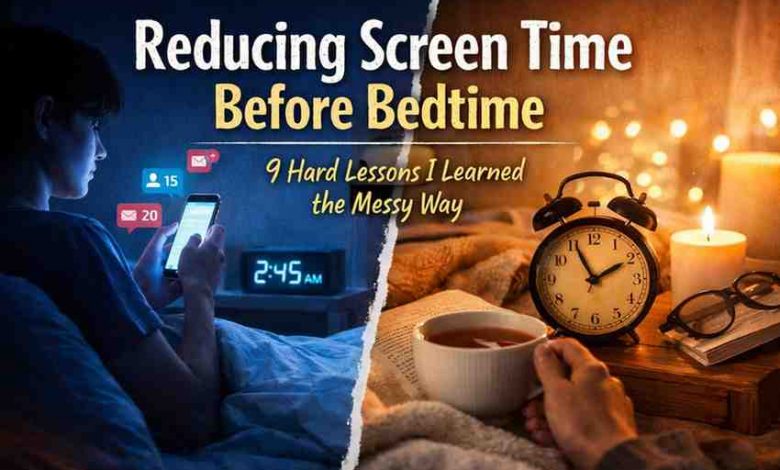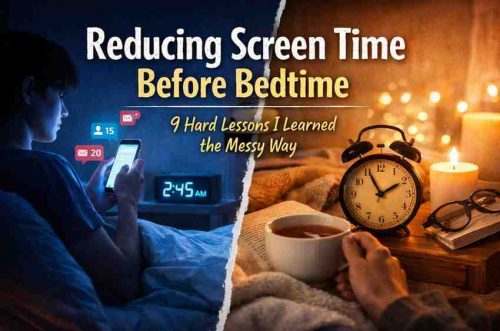

Not gonna lie… reducing screen time before bedtime sounded like one of those boring wellness tips people pretend to follow and absolutely don’t.
Like “drink more water” or “don’t check work emails on weekends.”
Cute idea, impossible execution.
For years, I’d climb into bed with my phone like it was my emotional support pet.
TikTok? Yup.
Late-night Amazon browsing? Absolutely.
Checking messages I ignored all day? Obviously.
Doing a “quick” Google rabbit hole on something random like “why do dogs dream?” Sure, why not.
And every night ended the same way:
-
brain buzzing
-
eyes burning
-
sleep refusing to start
-
waking up feeling like a microwaved zombie
-
promising myself “tonight will be different” and lying
But at some point — somewhere between my fourth sleepless night and my tenth “why am I like this?” meltdown — I realized my phone was basically the third wheel in my relationship with sleep.
And reducing screen time before bedtime finally stopped being a wellness cliché and became the thing that saved me.
This is the messy story of how I got there.
The Moment I Realized My Phone Was Ruining My Night
There wasn’t some dramatic “wake-up call.”
Just one stupid little moment.
I was in bed, scrolling, again, and my eyes started doing that dry, itchy blink pattern that should be illegal.
I looked at the time.
2:17 a.m.
And I had to be up at 7:00.
My body whispered, “You’re ruining us.”
My thumb whispered, “Just one more video.”
And that was the moment I knew something had to change — because I genuinely didn’t trust myself anymore.
Not with bedtime.
Not with screens.
Not with that never-ending scroll that tricks your brain into thinking it’s resting when it’s actually frying.
So yeah, reducing screen time before bedtime wasn’t a choice.
It was survival.
1. The First Week Was a Disaster (You’re Allowed to Laugh)
You’d think “just stop using your phone at night” would be simple.
Spoiler: it’s not.
Here’s how my first week went:
Night 1
I put my phone on the table, turned off the lights…
and immediately felt like I abandoned a baby in another room.
Night 2
I turned it off completely.
Turned it back on 10 minutes later.
Panicked because I “might need it.”
Need it for what?
The apocalypse?
Night 3
I tried reading a book.
Fell asleep after 3 pages.
Woke up thinking it was midnight.
It was 9:14 p.m.
Night 4
Downloaded a calming app.
Guess what needs a screen to use?
Yup.
Night 5
Threw my phone to the far end of the bed like a dramatic movie character.
Immediately crawled across the bed to get it.
Honestly, reducing screen time before bedtime made me feel like I was detoxing.
Not from tech — from the habit of numbing my brain every night.
But then something started to shift.
2. The First Sign Things Were Working (And It Surprised Me)
It wasn’t that I slept better right away.
It wasn’t even that I fell asleep faster.
It was this:
My brain stopped racing.
Not fully.
But enough that I could actually hear my own thoughts instead of drowning them in bright screens and noise.
Reducing screen time before bedtime didn’t fix my sleep immediately —
but it started giving my brain a chance to unwind.
And little by little, the nights changed.
3. The Weird Benefits I Didn’t Expect
Here’s where it got interesting.
After about 2–3 weeks, I noticed things nobody told me about:
• My dreams came back
I know this sounds fake, but I hadn’t dreamed in months.
• I woke up softer
Like, not ready to fight the world.
• My anxiety quieted a bit
Not gone… just less loud.
• I stopped doomscrolling
That alone was worth everything.
• I started falling asleep faster without trying
My body had been waiting for this.
• My morning mood was less “goblin energy”
Honestly… a miracle.
Reducing screen time before bedtime doesn’t just protect your sleep —
it protects your sanity.
4. The Dumb Myths I Believed at First (They Wasted My Time)
Not gonna lie, I went into this with all the wrong ideas.
Myth #1: “I need my phone to relax.”
Turns out, scrolling keeps your brain in “I’m awake!!!” mode.
Myth #2: “Blue light glasses will fix everything.”
They help a little.
But not enough to justify my 1 a.m. TikTok marathons.
Myth #3: “I can just reduce screen brightness.”
Yeah, no.
Your brain still knows you’re staring at a tiny sun.
Myth #4: “Background noise is harmless.”
It’s not the noise — it’s the habit of holding the phone.
Myth #5: “I can multitask rest + phone.”
The biggest lie I ever told myself.
5. What Actually Helped Me Reduce Screen Time Before Bedtime
Here’s the part that actually worked — the real stuff, not the influencer stuff.
(1) The “phone bedtime” rule
My phone gets “tucked in” 45 minutes before I do.
Not joking.
It has a spot.
(2) Charging it OUTSIDE the bedroom
This was painful.
But it helped more than anything.
(3) Creating a stupidly simple nighttime routine
Nothing fancy:
-
shower
-
short walk inside the house
-
dim lights
-
water
-
sit down for 5 minutes without doing anything
Not glamorous.
But my brain responds to repetition.
(4) Boring tasks
Folding clothes
Lining up my shoes
Setting out tomorrow’s outfit
Whatever.
Boring = sleepy.
(5) An actual alarm clock
Because relying on my phone was a trap.
(6) Audiobooks
But here’s the trick:
Play them from a distance, NOT in hand.
(7) A “no notifications after 9 PM” rule
Life-changing.
6. The Slip-Ups (Because This Isn’t a Hallmark Movie)
Just being honest —
I didn’t magically become a tech-free bedtime angel.
I had slip-ups:
-
binge-watched an entire show
-
checked messages at 12:08 a.m.
-
did that “one quick scroll” that lasted 47 minutes
-
stayed up reading comments on a random post from 2019
Reducing screen time before bedtime isn’t linear.
You try, you fail, you adjust, you try again.
And each time I messed up, I noticed the difference the next morning:
-
groggier
-
crankier
-
heavier
-
mentally foggier
It wasn’t guilt that pushed me back on track.
It was the memory of how much worse I felt when I didn’t stick to it.
7. How Long It Took to See Real Results
Nobody tells you this, so I will.
Here’s what reducing screen time before bedtime actually looked like for me:
-
Week 1: chaos, frustration, insomnia
-
Week 2: slightly calmer nights
-
Week 3: falling asleep faster
-
Week 4: waking up with more energy
-
Week 5: screen cravings fading
-
Week 6: sleep actually improving
-
Week 8: became part of my life
It wasn’t instant gratification.
But it was real.
8. The Mental Shift I Didn’t Expect
This was the surprising part…
I realized I wasn’t addicted to my phone.
I was addicted to distraction.
Screens before bedtime weren’t a habit —
they were an escape from stress, loneliness, boredom, overthinking.
Reducing screen time forced me to feel again.
To think.
To actually unwind instead of numbing myself.
It wasn’t comfortable.
At first, it honestly sucked.
But with time, it felt like I finally got my brain back.
9. The Takeaways I Wish Someone Told Me Earlier
Here’s the real stuff.
The things I learned the hard way.
1. Your brain can’t shut down if your phone keeps waking it up.
2. Reducing screen time before bedtime helps WAY more than melatonin.
3. You don’t need discipline — you need boundaries.
4. Your phone isn’t the enemy. Your habits are.
5. Sleep improves when your evenings have structure.
6. Start small or you’ll burn out immediately.
7. You don’t have to be perfect — you just have to try.
Look, I don’t have some shiny, motivational ending.
Reducing screen time before bedtime didn’t transform me into a perfect sleeper or some zen monk.
But it did make me feel human again.
It gave my nights back.
It gave my mornings a fighting chance.
And honestly… it made me kinder to myself.
If you’re trying to fix your nights too, I’m rooting for you.
This stuff is messy.
But it is doable.
And it’s absolutely worth it.



